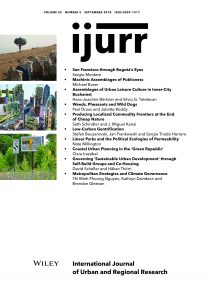This article focuses on the emergence of ‘low‐carbon’ gentrification as a distinct urban phenomenon, a process that we see as the outcome of efforts to change the social and spatial composition of urban districts under the pretext of responding to climate change and energy efficiency imperatives. The article develops a conceptual framework for scrutinizing low‐carbon gentrification, predicated upon insights from literatures on ecological gentrification and displacement. It documents the existence of an ‘eco‐social paradox’ associated with new patterns of socio‐spatial segregation and energy efficiency retrofits. We interrogate the discursive and policy frameworks, socio‐spatial implications and political contestations of low‐carbon gentrification. Evidence is drawn from case study research in an inner‐city district of the Polish city of Gdańsk, where such processes have been unfolding since 2006 due to the implementation of a targeted urban regeneration programme. This investigation is positioned within a wider analysis of secondary written sources about similar developments in other geographical contexts across Europe and North America, where anecdotal evidence suggests that low‐carbon gentrification may be widespread and common.
Details
Written by:
Stefan Bouzarovski, Jan Frankowski & Sergio Tirado Herrero
Digital Object Identifier (DOI)
10.1111/1468-2427.12634
About DOI

